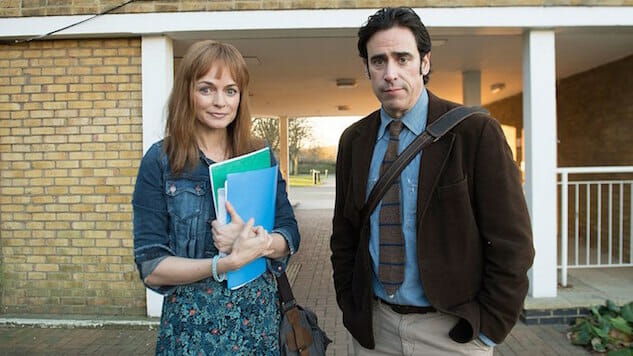David Cross’ Bliss Isn’t a Marriage Farce. It’s a Pitch-Dark Portrait of a Selfish Man.
Photo: BritBox
“First of all, I didn’t plan for this to happen. It just sort of happened. And then it kept on happening… It’s complicated.” —Andrew Marsden (Stephen Mangan), Bliss
Not to be confused with the erotic Oxygen series from the aughts, Bliss could be easily renamed Gaslighting: The Series. Created and directed by David Cross (who also wrote or co-wrote every episode but the third), Bliss is a wolf in sheep’s clothing, just like its lead character, Andrew Marsden (Stephen Mangan), a husband and father—times two.
Marsden is an esteemed travel writer whose persona is predicated on his anonymity. (He’s known as “The Anonymous Traveler”; his books even have “by ?” on the covers.) Except his jet-setting is a lie on top of all of his other lies: He never goes any further than the Bristol Airport, and that’s only to change cars and drive back to one of his two families. Coupled with a life of lies, Andrew’s built a life of “convenience,” in the sense that his two separate lives are actually in the same British town. He spends a week—eight days at most—with one of his families before he’s “off to work,” to spend a week with his other family. Yes, he has a protocol for how he makes his wives believe he truly was in certain cities as well as one for how he mentions his family in his books.
From the theme music (the Beach Boys’ “Wouldn’t It Be Nice”) to the casting of Mangan (coming off a five-season run on Episodes and an against-type performance in the recent BBC One/Sundance TV drama The Split) in the lead role, Bliss has the sheen of a family sitcom with a happy ending waiting somewhere around the corner. In fact, Bliss has all the markers of a classic British farce, like Goodnight Sweetheart, a BBC sitcom (with time travel) from the ’90s that it’s been compared to. And while the modern setting highlights how questionable the premise is—Andrew is essentially an “accidental” bigamist, married to two women, with two teenage children as a result of these partnerships—as a comedy starring the generally affable Mangan, the natural assumption is that the audience is supposed to want everything to work out for Andrew. Or, at least, feel sympathy for his situation. After all, as Andrew says in voiceover, “It just sort of happened… It’s complicated.”
That natural assumption turns out to be incorrect. Ultimately, Bliss is a dark comedy examining the lengths to which a man—and not a particularly sympathetic or good one—will go to keep up his lies and to keep enjoying the lives to which he’s grown accustomed. Even if the enjoyment of those lives has been completely sapped because of said lies. Despite the 20-plus-minute episode runtime (save the pilot, which is a little more than 42 minutes), Cross is hesitant even to call the series a comedy or a sitcom, perfectly aware of the can of worms that classification opens to people expecting the series to be funnier or less dark than it gets. And the series gets really dark, to varying levels of success, while also melding itself with the most intense levels of cringe comedy. The funniest moments are honestly the images of Andrew silently sobbing, which are strangely cathartic—as the audience knows he deserves to suffer at least in some way—and also bursts of excellence from Mangan.
Like Cross’ previous dalliance with British dark comedy, The Increasingly Poor Decisions of Todd Margaret, Bliss plays up the cringe factor to the point of ultimate discomfort, with a lead character surrounded by a world of chaos he both causes and can’t quite control. Here, that means things like pretending to be racist just to prevent being found out or interfering in his children’s happiness just to make sure the separation between the two households sticks. While Todd Margaret and Andrew Marsden are similar, in the sense that so many of their problems could be solved if they truly listened to anyone but themselves, the latter is almost too aware of his surroundings, and he puts himself in a prison of his own making because of that. The trick with Bliss is that the audience shouldn’t and ultimately doesn’t want Andrew’s problems to be solved.
-

-

-

-

-

-

-

-

-

-

-

-

-

-

-

-

-

-

-

-

-

-

-

-

-

-

-

-

-

-

-

-

-

-

-

-

-

-

-

-








































